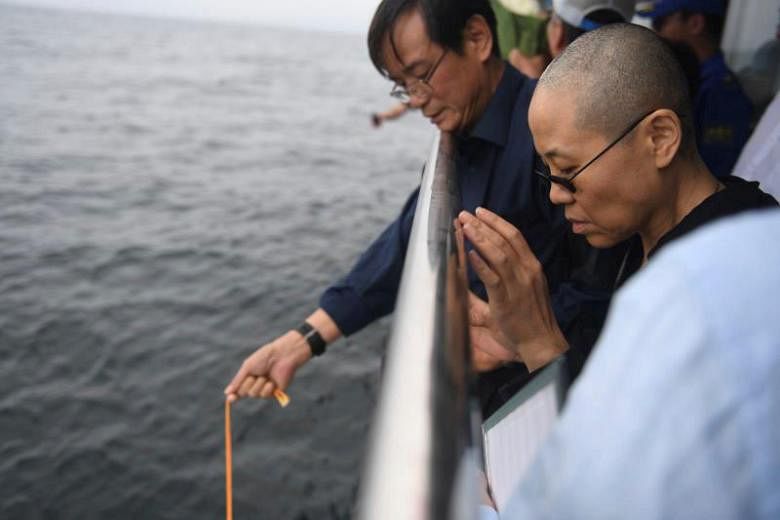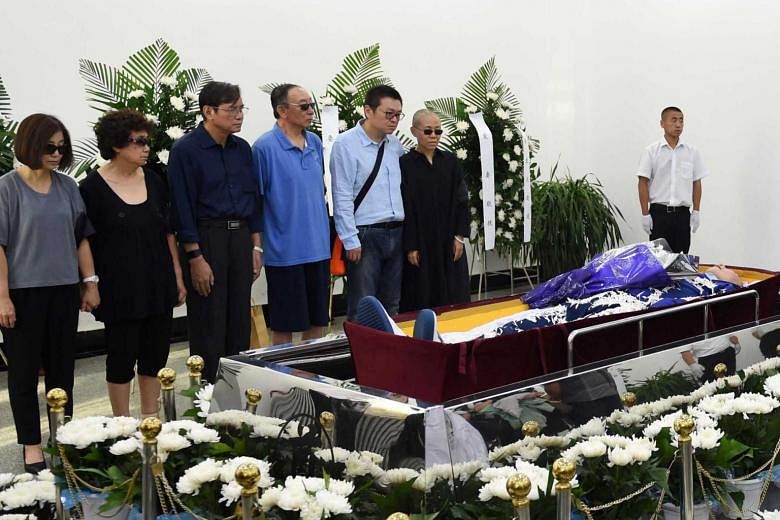SHENYANG (REUTERS/AFP) - The ashes of late Chinese Nobel laureate and dissident Liu Xiaobo were scattered in the sea on Saturday (July 15), his brother said, hours after his body was cremated.
His older brother, Liu Xiaoguang, made the announcement at a news conference organised by the authorities, which have tightly controlled access to the family of the prominent government opponent, who died of liver cancer while in custody on Thursday.
Earlier on Saturday, a government official said Liu's wife is "free", even as a state-run newspaper attacked Liu as a "despised" criminal out of step with Chinese society.
Liu, 61, died in a hospital in the north-eastern city of Shenyang, after he was given medical parole but not freed. He had been jailed for 11 years in 2009 for "inciting subversion of state power" after helping to write a petition known as "Charter 08" calling for sweeping political reforms.
His wife, poet Liu Xia, has been under effective house arrest since her husband won the Nobel Peace Prize in 2010, but had been allowed to visit him in prison about once a month.
City government information official Zhang Qingyang said Liu Xiaobo was cremated on Saturday morning, in accordance with his relatives' wishes and local customs.
A government statement said Mozart's Requiem was played during the funeral, a work of music Mozart left unfinished on his death bed.
Officials released photos showing Liu Xia, with her brother, Liu Xiaobo's brother and friends in front of the body surrounded by white flowers at a funeral home.
"Since she had just lost her husband, she was in very low spirits," Zhang told a news conference in Shenyang. "In the period after dealing with the death of Liu Xiaobo, she won't take anymore outside disturbances. This is the wish of the family members. It's natural."
The grieving Liu Xia and relatives stood in front of her husband's body, and she "fixed her eyes on him a long time, mumbling to say farewell", Zhang said.
Liu Xia was given the ashes, Zhang said, and added that according to his understanding, "Liu Xia is free". But he did not reveal her whereabouts.

"We want Liu Xia to avoid more trouble," he added. "I believe the relevant departments will protect
Liu Xia's rights according to the law."
During the past couple of weeks, Liu Xia had been at the hospital as her husband's health deteriorated.
Jared Genser, a US lawyer who represented Liu Xiaobo, said Liu Xia has been held "incommunicado" since his death. She has never been charged with any crime, he said. "The world needs to mobilise to rescue her - and fast," he said in a statement.
Rights groups and Western governments have mourned Liu Xiaobo's death and urged the authorities to grant freedom of movement to his wife and the rest of his family. China has repeatedly attacked foreign governments for their concern about Liu and calls to allow
Liu Xia to leave the country if she wishes.
State-run Global Times said Liu wanted to overthrow China's political system and replace it with the Western model. "He was paranoid, naive and arrogant," it said in an English-language editorial on Saturday. "He had been divorced from the main theme of Chinese society and therefore became a man of the past, a political agitator and opponent."
Liu threw himself into the lap of Western forces and Western support had become a key source of his influence, it added. "However, his influence has breached the fundamental moral principle of Chinese patriotism and posed a challenge to China's stability and national security. This is why Chinese society opposes and despises him."




